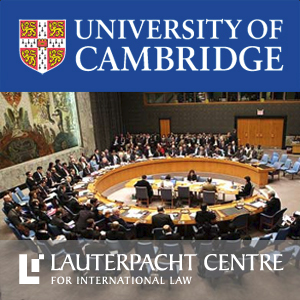'A Wolf in Sheep's Clothing? Transitional Justice and the Effacement of State Accountability for International Crimes' by Lauren E. Fletcher
Duration: 44 mins 35 secs
Share this media item:
Embed this media item:
Embed this media item:
About this item

| Description: |
The Lauterpacht Centre for International Law (LCIL), University of Cambridge hosts a regular Friday lunchtime lecture series on key areas of International Law. Previous subjects have included UN peacekeeping operations, the advisory jurisdiction of the International Court of Justice, the crime of aggression, whaling, children and military tribunals, and theories and practices for proving individual responsibility criminal responsibility for genocide and crimes against humanity.
This lecture, entitled 'A Wolf in Sheep's Clothing? Transitional Justice and the Effacement of State Accountability for International Crimes', was delivered at the Lauterpacht Centre on Friday 12th February 2016 by Laurel Fletcher, Clinical Professor of Law at the University of California Berkeley. For more information about the series, please see the LCIL website at http://www.lcil.cam.ac.uk/ |
|---|
| Created: | 2016-02-15 14:13 |
|---|---|
| Collection: | LCIL International Law Seminar Series MOVED |
| Publisher: | University of Cambridge |
| Copyright: | University of Cambridge |
| Language: | eng (English) |
| Keywords: | International Law; International Criminal Law; International Public Law; Human Rights Law; |
| Abstract: | If international atrocity crimes are acts so egregious that their impunity cannot be legally tolerated, why don’t we punish states that commit them? The rise of international criminal law is celebrated as an achievement of the international rule of law, yet its advance effectively may come at the expense of holding states accountable for their role in mass violence. Transitional justice has emerged as the dominant normative framework for how the international community responds to mass violence. Liberalism strongly influences transitional justice, which has produced individual criminal accountability as the desired form of legal accountability for atrocities. Transitional justice rejects punishing states for atrocities as illiberal (collective punishment) and illegitimate (lack of positive law). In fact, transitional justice theorization of justice largely ignores legal accountability for states. Without legal accountability, states enjoy moral and legal impunity for their crimes. States escape their legal obligations to repair the injury they cause and to institute reforms that secure a fuller measure of justice and peace. In her talk, Professor Fletcher discusses her recent research examining how international law and transitional justice have developed conceptually to effectively prevent legal accountability for states that commit atrocity crimes and argue that a new politics of transitional justice is necessary to harness the productive potential of state legal accountability to achieve a fuller measure of international justice. This work will be published in the Fordham International Law Journal. |
|---|---|

